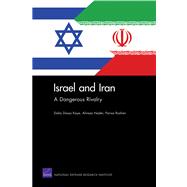
| Preface | p. iii |
| Summary | p. ix |
| Acknowledgments | p. xv |
| Introduction | p. 1 |
| Israel and Iran Increasingly View Each Other as Regional Rivals | p. 1 |
| The Rivalry Can Further Destabilize the Region, Particularly as Iranian Nuclear Efforts Move Forward | p. 4 |
| Study Organization and Approach | p. 7 |
| A Brief History of Israeli-Iranian Cooperation and Confrontation | p. 9 |
| The Periphery Doctrine: The Enemies of My Enemy Are My Friends | p. 10 |
| Military and Economic Cooperation During the Shah's Rule | p. 12 |
| Israeli-Iranian Cooperation After the 1979 Revolution | p. 13 |
| A Growing Rivalry | p. 16 |
| Conclusion | p. 17 |
| Israeli Perceptions of and Policies Toward Iran | p. 19 |
| Geostrategic Concerns Are Driving Israeli Threat Perceptions of Iran, but So Is Iranian Ideology | p. 20 |
| Iranian Military Capabilities, Particularly Its Missile Program, Elevated the Iranian Threat in the 1990s | p. 20 |
| Israeli Concerns About Iran Extend Beyond Military Capabilities to Balance of Power Considerations | p. 25 |
| Israelis Are Concerned About the Influence a Nuclear Weapon Would Give Iran | p. 27 |
| Israelis Nonetheless Take Iranian Ideology and Potential Nuclear Use Seriously | p. 30 |
| Domestic Differences Emerge over How to Discuss and Respond to the Iranian Challenge | p. 35 |
| Some Debate Has Emerged About the Use of the "Existential Threat" Language | p. 36 |
| The Greatest Fissures Within the Security Establishment Emerge over Differing Cost-Benefit Assessments of a Military Strike Option | p. 38 |
| Views of the Effectiveness of Sanctions and Sabotage Efforts Such as Stuxnet, as Well as the U.S. Position, Could Affect the Israeli Debate on the Military Option | p. 43 |
| Israel and Iran in the Future | p. 47 |
| Military Doctrine and Policy Are Shifting in Ways That Suggest Some Preparation for a Nuclear Future with Iran | p. 47 |
| Israel's Own Nuclear Posture Could Also Shift with a Nuclear-Armed Iran | p. 48 |
| Conclusion | p. 53 |
| Iranian Perceptions of and Policies Toward Israel | p. 55 |
| Regime Ideology and Geostrategic Factors Shape Iranian Threat Perceptions of Israel | p. 57 |
| Iran Views U.S. and Israeli Interests as Nearly Identical | p. 57 |
| The Regime Views Israel as Undermining Its Stability | p. 60 |
| The U.S. "Threat" Determines Iran's Military Posture Against Israel | p. 63 |
| Iran Increasingly Views Israel as a Direct Geopolitical Threat | p. 65 |
| Domestic Politics Are a Strong Driver of Iranian Policies Toward Israel | p. 70 |
| Different Factions Have Varying Views of Israel | p. 70 |
| The Ascent of the Principlists Has Led to Greater Rivalry | p. 73 |
| A Future Regime May View Israel Differently | p. 77 |
| Conclusion | p. 79 |
| fconclusion and Recommendations | p. 81 |
| U.S. Policies Toward Israel | p. 83 |
| U.S. Polices Toward Iran | p. 86 |
| Managing the Rivalry | p. 87 |
| Bibliography | p. 89 |
| Table of Contents provided by Ingram. All Rights Reserved. |
The New copy of this book will include any supplemental materials advertised. Please check the title of the book to determine if it should include any access cards, study guides, lab manuals, CDs, etc.
The Used, Rental and eBook copies of this book are not guaranteed to include any supplemental materials. Typically, only the book itself is included. This is true even if the title states it includes any access cards, study guides, lab manuals, CDs, etc.